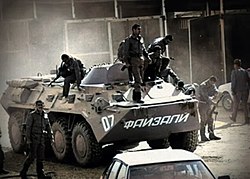
Back الحرب الأهلية الطاجيكية Arabic Tacikistanda vətəndaş müharibəsi Azerbaijani تاجیکیستان ایچ ساواشی AZB Грамадзянская вайна ў Таджыкістане Byelorussian Гражданска война в Таджикистан Bulgarian তাজিকিস্তানের গৃহযুদ্ধ Bengali/Bangla Građanski rat u Tadžikistanu BS Guerra Civil del Tadjikistan Catalan Občanská válka v Tádžikistánu Czech Rhyfel Cartref Tajicistan Welsh
| Tajikistani Civil War | |||||||
|---|---|---|---|---|---|---|---|
| Part of the post-Soviet conflicts and spillover of the Afghan Civil War (1992–1996) | |||||||
 Spetsnaz soldiers of the 15th Independent Special Forces Brigade during the Civil War | |||||||
| |||||||
| Belligerents | |||||||
|
|
| ||||||
| Commanders and leaders | |||||||
|
|
| ||||||
| Strength | |||||||
|
| Estimated around 50,000–70,000 | ||||||
| Casualties and losses | |||||||
| Unknown | Unknown | ||||||
|
20,000[10]–150,000 killed[11] 1.2 million displaced | |||||||
|
| |||||||
The Tajikistani Civil War,[pron 1] also known as the Tajik Civil War, began in May 1992 and ended in June 1997. Regional groups from the Garm and Gorno-Badakhshan regions of Tajikistan rose up against the newly-formed government of President Rahmon Nabiyev, which was dominated by people from the Khujand and Kulob regions. The rebel groups were led by a combination of liberal democratic reformers[12] and Islamists, who would later organize under the banner of the United Tajik Opposition. The government was supported by Russian military and border guards.[13]
The main zone of conflict was in the country's south, although disturbances occurred nationwide.[14][15] The civil war was at its peak during its first year and continued for five years, devastating the country.[14][16] An estimated 20,000[10] to 150,000[11] people were killed in the conflict, and about 10 to 20 percent of the population of Tajikistan were internally displaced.[13] On 27 June 1997, Tajikistan president Emomali Rahmon, United Tajik Opposition (UTO) leader Sayid Abdulloh Nuri and Special Representative of the United Nations Secretary-General Gerd Merrem signed the General Agreement on the Establishment of Peace and National Accord in Tajikistan and the Moscow Protocol in Moscow, Russia, ending the war.[17]
- ^ "Tajikistan: President Meets With Popular Front Commanders". Radio Liberty Archives. 9 July 1997. Archived from the original on 12 October 2017. Retrieved 23 June 2017.
- ^ "Американцы боятся белорусских танков. Белоруссия американских санкций не боится" [Americans are afraid of Belarusian tanks. Belarus is not afraid of American sanctions]. Lenta.ru (in Russian). 1 March 2002. Archived from the original on 20 November 2021.
- ^ Jonson, Lena (25 August 2006). Tajikistan in the New Central Asia. Bloomsbury Academic. ISBN 9781845112936. Archived from the original on 16 January 2016. Retrieved 17 December 2014.
- ^ Inside Al Qaeda: global network of terror, by Rohan Gunaratna, pg. 169
- ^ "Iran dismisses Tajik civil war claims as attempt to damage ties". Reuters. Retrieved 10 August 2017.
- ^ "A Thaw Between Tajikistan and Iran, But Challenges Remain". Jamestown. Retrieved 10 July 2019.
Fearing a continuity of Soviet-era policies, Iran supported the Islamic and nationalist opposition during the civil war.
- ^ Abdulfattoh, Shafiev (February 2016). "Iran and Tajikistan: A Story of Love and Hate" (PDF). Central Asia Policy Brief. 34.
At the end of 1992, Tajikistan entered into a bloody civil war. Tehran gave refuge and support to the leaders of the Democratic-Islamic coalition of the Tajik opposition, and was therefore considered to be a pro-Islamic actor. However, it also contributed a critical role in helping peace discussions: Tehran hosted several rounds of the Tajik peace negotiations in 1994, 1995, and 1997, bringing both sides to the discussion table. President Rahmon paid an official visit to Tehran in 1995 and opened an embassy there. But seen from Dushanbe, Moscow was a more reliable ally than Tehran, and any kind of pan-Persian nationalism was rapidly shut down by the authorities.
- ^ Ahmad, Majidyar. "Tajikistan Accuses Iran of Sponsoring Terrorism, Restricts Iranian Organizations' Activities". Middle East Institute. Retrieved 9 August 2017.
Tajikistan has accused Iran of having played a subversive role in the country's civil war in the 1990s by sending terrorists to the Central Asian republic, the latest sign of deteriorating relations between the two countries.
- ^ "Боевые действия на таджикско-афганской границе (начало 1990–х гг.)". Archived from the original on 13 November 2020. Retrieved 5 May 2020.
- ^ a b Pannier, Bruce (26 June 2017). "The Many Agents Of Tajikistan's Path To Peace". Radio Liberty. Archived from the original on 3 July 2017. Retrieved 4 July 2017.
- ^ a b "The Peace Deal That Ended Tajikistan's Bloody Civil War". RadioFreeEurope/RadioLiberty. 27 June 2021. Archived from the original on 31 August 2022. Retrieved 31 August 2022.
- ^ Dubovitsky, Viktor (February 2003). "Features of the ethnic and confessional situation in the Republic of Tajikistan" (in Russian). Archived from the original on 11 April 2008.
- ^ a b Pannier, Bruce (23 June 2017). "Tajikistan's Civil War: A Nightmare The Government Won't Let Its People Forget". Radio Free Europe/Radio Liberty. Archived from the original on 5 June 2019. Retrieved 20 May 2019.
- ^ a b "The Tajik civil war: Causes and dynamics". Conciliation Resources. 30 December 2011. Archived from the original on 12 April 2019. Retrieved 20 May 2019.
- ^ Hays, Jeffrey. "TAJIKISTAN CIVIL WAR – Facts and Details". factsanddetails.com. Archived from the original on 5 May 2019. Retrieved 20 May 2019.
- ^ Pannier, Bruce (9 October 2018). "Tajikistan's Unconquerable Gorno-Badakhshan Region". Radio Free Europe/Radio Liberty. Archived from the original on 12 April 2019. Retrieved 20 May 2019.
- ^ Tajikistan Civil War Archived 14 April 2007 at the Wayback Machine Global Security
Cite error: There are <ref group=pron> tags on this page, but the references will not show without a {{reflist|group=pron}} template (see the help page).
© MMXXIII Rich X Search. We shall prevail. All rights reserved. Rich X Search